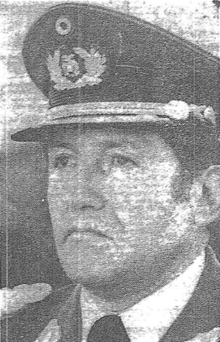Luis García Meza
This article has multiple issues. Please help improve it or discuss these issues on the talk page. (Learn how and when to remove these template messages)
|
Luis García Meza | |
|---|---|
 | |
| 57th President of Bolivia | |
| In office 17 July 1980 – 4 August 1981 | |
| Vice President | Vacant |
| Preceded by | Lidia Gueiler (interim) |
| Succeeded by | Celso Torrelio |
| Personal details | |
| Born | Luis García Meza Tejada 8 August 1929 La Paz, Bolivia |
| Died | 29 April 2018 (aged 88) La Paz, Bolivia |
| Spouse(s) | Eldy Caballero Olma Cabrera |
| Children | 3 |
| Parent(s) | Luis García Meza Crespo Alicia Tejada |
| Relatives | José Luis Tejada Sorzano (uncle) Lidia Gueiler (cousin) |
| Education | Military College of the Army |
| Signature | |
| Military service | |
| Allegiance | |
| Branch/service | |
| Years of service | 1952–1981 |
| Rank | General |
Luis García Meza Tejada (8 August 1929 – 29 April 2018) was a Bolivian general who served as the de facto 57th president of Bolivia from 1980 to 1981. He was a dictator convicted of human rights violations and leader of a violent coup. A native of La Paz, he was a career military officer who rose to the rank of general during the dictatorship of Hugo Banzer (1971–78).
Prelude to dictatorship
García Meza graduated from the military academy in 1952, and served as its commander from 1963 to 1964. He then rose to division commander in the late 1970s.
He became the leader of the
Coup d'état
| 1980 Bolivian coup d'état | |||||||
|---|---|---|---|---|---|---|---|
| |||||||
| Belligerents | |||||||
|
Supported by: |
Supported by: | ||||||
| Commanders and leaders | |||||||
|
Lidia Gueiler Tejada |
Luis García Meza Tejada | ||||||
This group pressured President
Dictatorship, 1980-81
Of rightwing ultra-conservative
The García Meza regime, while brief (its original form ended in 1981), became internationally known for its extreme brutality. The population was repressed in the same ways as under the Banzer dictatorship. In January 1981, the
The most prominent victim of the dictatorship was the congressman, presidential candidate, and gifted orator Marcelo Quiroga, murdered and "disappeared" soon after the coup. Quiroga had been the chief advocate of bringing to trial the former dictator, General Hugo Banzer (who was in power from 1971 until 1978), for human right violations and economic mismanagement.
Drug trafficking
The García Meza government's
The Bolivian military would sustain itself in power only for another year, and would then retreat to its barracks, embarrassed and tarnished by the excesses of the 1980–82 dictatorships (it has never returned to the Palacio Quemado).
Exile and jail
García Meza left the country but was tried and convicted in absentia for the serious human rights violations committed by his regime. on march 14, 1995, he was extradited to Bolivia from Brazil and was given a 30-year prison sentence, at the San Pedro's penitentiary in La Paz, the very same penitentiary where he once kept his enemies. His main collaborator, Colonel Arce, was extradited to the United States, where he served a prison sentence for drug trafficking.
García Meza had reportedly been living in considerable comfort whilst in prison, with a barbecue, a gym, and a telephone at his disposal, in addition with a sauna and the occupation of three cells. These privileges were later revoked in response to protests from human rights organisations and victims.[4]
Death
García Meza died at the Cossmil military hospital, where he was serving the remainder of his 30-year prison term in
See also
- Cabinet of Luis García Meza
- Roberto Suárez Goméz
References
- ISBN 978-84-9793-459-6.
- ^ "Archived copy" (PDF). Archived from the original (PDF) on 13 February 2011. Retrieved 2 April 2012.
{{cite web}}: CS1 maint: archived copy as title (link) - ^ http://ssdc.ucsd.edu/news/notisur/h95/notisur.19950317.htm[permanent dead link]
- ^ "Destituyen a gobernador de Chonchocoro y presentan querella por omisión en caso García Meza". 3 March 2016. Archived from the original on 3 March 2016. Retrieved 5 November 2019.
- ^ "Former military dictator of Bolivia dies". 29 April 2018.
- ^ "La Razón (Bolivia) - Murió Luis García Meza". m.la-razon.com.
- ^ "Bolivia's 'Cocaine Coup' dictator Luis Garcia Meza dies at 88 - DW - 29.04.2018". DW.COM.
- ^ Sam Roberts (2 May 2018). "Luis Garcia Meza, Bolivian dictator jailed for Genocide, Dies at 88". New York Times. Retrieved 29 May 2022.
Bibliography
- Mesa José de; Gisbert, Teresa; and Carlos D. Mesa, "Historia De Bolivia," 5th edition, pp. 681–689.
- Prado Salmón, Gral. Gary. "Poder y Fuerzas Armadas, 1949–1982."

